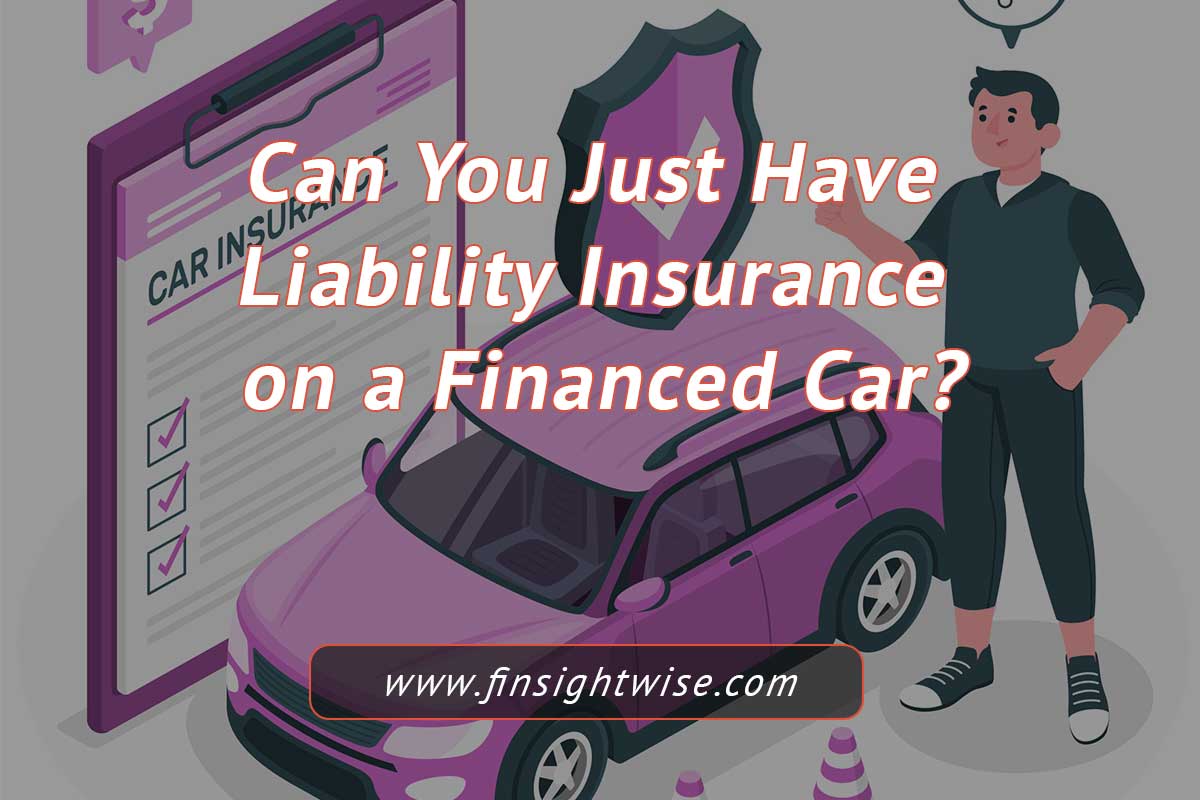When it comes to protecting your investment in a financed vehicle, understanding your insurance options is crucial. Many car owners wonder, can you just have liability insurance on a financed car? The answer might surprise you.
Liability insurance is often seen as the bare minimum for car coverage, but is it enough when you're still making payments? This question raises important considerations about your financial security and the requirements set by lenders.
In this article, we’ll delve into the implications of opting for only liability insurance on a financed car. We’ll explore the risks involved and what you need to know to ensure you’re adequately covered.
Join us as we uncover the truth behind the question: can you just have liability insurance on a financed car? Discover how to safeguard your investment and make informed decisions about your insurance coverage.
Table of Contents
Togglecan you just have liability insurance on a financed car
Yes, you can technically have only liability insurance on a financed car, but doing so is likely to violate your loan agreement. Most lenders require borrowers to maintain full coverage, which includes liability, collision, and comprehensive insurance, to protect their investment in the vehicle.
Key Points
- Liability Insurance Only: Liability insurance covers damages or injuries you cause to others in an accident but does not cover your own vehicle. If you opt for only this coverage while financing a car, you may breach your contract with the lender.
- Lender Requirements: Lenders typically mandate full coverage to ensure that they can recover their investment in case of damage or total loss of the vehicle. If you drop to liability-only coverage, the lender may purchase force-placed insurance on your behalf, which is usually more expensive and added to your loan balance.
- Consequences of Insufficient Coverage: If your lender discovers that you have insufficient insurance, they might notify you to correct it. Failure to do so could result in penalties, increased payments, or even repossession of the vehicle if considered a default on the loan.
Understanding Financed Cars
A financed car is a vehicle purchased with the help of a loan from a lender, such as a bank, credit union, or dealership. The lender maintains a financial interest in the car until the loan is fully repaid.
When you finance a car, you typically enter into a loan agreement that outlines the terms of the financing, including:
- The loan amount
- The interest rate
- The repayment period
- The monthly payments
As the borrower, you have the right to use the car as long as you make the required payments and adhere to the terms of the loan agreement. However, the lender retains the legal ownership of the vehicle until the loan is paid off.
Why Lenders Have a Financial Interest
Lenders have a vested interest in the car because they have provided the funds for its purchase. If you default on the loan payments, the lender has the right to repossess the vehicle to recoup their investment.
To protect their financial stake, lenders typically require borrowers to maintain full coverage insurance on the financed car. This ensures that the vehicle is adequately protected in case of an accident or theft.
Insurance Requirements for Financed Cars
When you finance a car, the lender typically requires you to maintain full coverage insurance on the vehicle. This means that in addition to liability insurance, you must also have collision insurance and comprehensive insurance.
Liability Insurance
Liability insurance covers damages and injuries you cause to other people and their property in the event of an accident. Most states have minimum liability coverage requirements that must be met.
Collision Insurance
Collision insurance covers the cost of repairing or replacing your car if it is damaged in a collision with another vehicle or object. This coverage is essential for protecting your investment in the financed car.
Comprehensive Insurance
Comprehensive insurance covers damages to your car that are not caused by a collision, such as theft, vandalism, natural disasters, or hitting an animal. It helps ensure that your financed car is protected from a wide range of potential risks.
Lenders require full coverage insurance to protect their financial interest in the vehicle. If you only have liability insurance and your car is damaged or stolen, the lender may not be able to recover their investment if the car is a total loss.
It's important to note that the specific insurance requirements may vary depending on the lender and the state in which you live. Always review your loan agreement carefully to understand the exact coverage requirements for your financed car.
Consequences of Having Only Liability Insurance
Opting for only liability insurance on a financed car can lead to several serious consequences. Understanding these risks is essential for anyone considering this insurance choice.
Breach of Loan Agreement
Most lenders require full coverage insurance as part of the loan agreement. If you only maintain liability coverage, you may be in breach of this agreement, which can lead to penalties or additional fees.
Force-Placed Insurance
If your lender discovers that you do not have the required coverage, they may purchase force-placed insurance on your behalf. This type of insurance is typically much more expensive and provides limited coverage, often only protecting the lender's interest.
Financial Risks
Having only liability insurance leaves you financially vulnerable in the event of an accident or theft. If your financed car is damaged or totaled, you could be responsible for paying off the remaining loan balance without receiving any compensation for the vehicle.
Risk of Vehicle Repossession
In extreme cases, failing to maintain adequate insurance can lead to the repossession of your vehicle. Lenders have the right to reclaim their asset if you do not comply with the terms of the loan agreement.
In summary, while liability insurance may seem like a cost-effective option, it can expose you to significant risks. It's crucial to weigh these potential consequences against the benefits of maintaining full coverage insurance on your financed car.
Transitioning to Liability Insurance After Loan Payoff
Once you have paid off your car loan, you may consider switching to liability insurance instead of maintaining full coverage. However, it's important to understand the conditions and implications of this change.
Conditions for Switching to Liability Insurance
Before making the switch, ensure that you have met the following conditions:
- You have paid off the entire loan balance.
- You own the vehicle outright, meaning there are no liens against it.
- You are comfortable with the risks associated with having only liability coverage.
Steps to Take After Loan Payoff
Once you confirm that you can switch to liability insurance, follow these steps:
- Contact your insurance provider to discuss your options.
- Request a quote for liability insurance and compare it with your current full coverage policy.
- Notify your lender that you have paid off the loan and are changing your insurance coverage.
Importance of Notifying Your Insurance Provider and Lender
It's crucial to inform both your insurance provider and lender about the change in coverage. This ensures that your records are updated and that you remain compliant with any remaining obligations.
While switching to liability insurance can reduce your monthly expenses, consider your driving habits and the potential risks involved. Maintaining adequate coverage is key to protecting your investment and financial stability.
Frequently Asked Questions - FAQs
Q. Can I have only liability insurance on a financed car?
A. While you technically can, most lenders require full coverage insurance to protect their financial interest in the vehicle. Liability insurance alone may breach your loan agreement.
Q. What is full coverage insurance?
A. Full coverage insurance typically includes liability insurance, collision insurance, and comprehensive insurance. This combination protects both you and the lender in case of accidents or damage.
Q. What happens if I don’t meet my insurance requirements?
A. Failing to meet your insurance requirements can lead to penalties, additional fees, or even force-placed insurance, which is often more expensive and limited in coverage.
Q. Can I switch to liability insurance after paying off my loan?
A. Yes, once you own the vehicle outright and have paid off your loan, you can switch to liability insurance, but be aware of the associated risks.
Q. What are the risks of having only liability insurance?
A. The main risks include financial vulnerability if your car is damaged or stolen, as you may still owe money on the loan without receiving compensation for the vehicle.
Q. How can I ensure I have adequate coverage?
A. Consult with an insurance professional to assess your needs and determine the best combination of insurance coverage for your financed vehicle.
Q. What should I do if I have an accident?
A. If you have an accident, contact your insurance provider immediately to report the incident and begin the claims process, regardless of your coverage type.
Q. Are there any state laws regarding minimum insurance coverage?
A. Yes, each state has its own laws regarding minimum insurance coverage requirements. It's essential to be aware of your state's regulations to remain compliant.
Q. How does force-placed insurance work?
A. Force-placed insurance is purchased by the lender when you fail to maintain required coverage. It protects the lender's interest but often comes at a higher cost and provides limited protection.
Q. Can I change my insurance provider after financing a car?
A. Yes, you can change your insurance provider after financing a car, but ensure that your new policy meets the lender's insurance requirements to avoid any issues.
Conclusion
In conclusion, while having only liability insurance on a financed car may seem like a cost-effective option, it can expose you to significant risks and potential consequences. Understanding the requirements set by lenders and the importance of maintaining adequate coverage is crucial for protecting your investment.
Remember, full coverage insurance is typically required for financed vehicles to safeguard the lender's financial interest. Opting for only liability coverage can lead to breaches of loan agreements, force-placed insurance, and even vehicle repossession in extreme cases.
If you are unsure about your insurance requirements or have questions regarding your coverage options, it's always best to consult with an insurance professional. They can provide personalized guidance based on your specific situation and help you make informed decisions about protecting your financed car.
By prioritizing adequate insurance coverage, you can drive with confidence, knowing that you have taken the necessary steps to safeguard your investment and financial stability. Stay informed, make wise choices, and enjoy the freedom of the open road.


